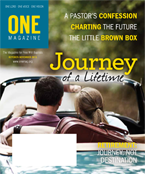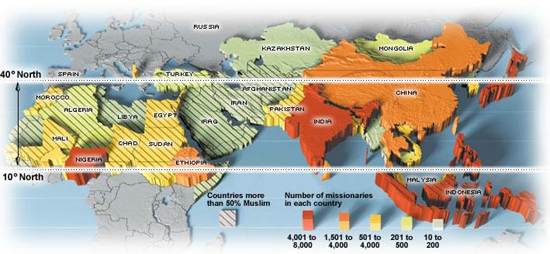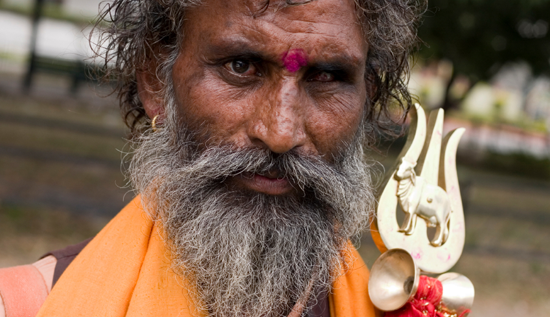
October-
November 2013
Journey of a Lifetime
------------------
|

Partnerships: Unreached People Groups and a New Day in Missions
by Jeff Turnbough
Transition to Partnership
Recently, I sat in Chame, Panama, in a circle with 20 leaders from the Panamanian Free Will Baptist National Association. We discussed the process of transitioning full-time, resident international missionaries away from a country where they have served for over 50 years. We began discussions on how to best help them continue developing the work. We also discussed partnering to send the gospel to unreached peoples around the world. What an encouraging conversation!
Transitioning out resident missionaries does not mean the end of our relationship with our brothers and sisters in Panama. Interdependence is a core biblical value, and one that drives our partnerships. We hope to continue with our Panamanian brothers until Jesus returns. How we do that in the future will look differently than it did in the past since many Panamanian leaders have been in the ministry for as many as 20, even 30, years.
The fact that we are having this kind of discussion with our brothers in Panama clearly demonstrates how much God has blessed our joint efforts to pray, support, and send our missionaries to this country. God has heard and answered our prayers.
An old mission paradigm described mission work as stages of relationships between missionary and national church—a transition from pioneer to parent to partner and, eventually, participant. As God blesses the efforts of missionaries, a national church is born, grows, matures, and reaches a stage when mature leaders participate as equal brothers alongside missionaries. This is precisely what the Mission is doing in Panama, as well as in other countries like Cuba, Brazil, Côte d’Ivoire, and India. The Church in these countries is ready, willing, and spiritually capable of participating with the North American Church to fulfill the Great Commission.
It is a healthy and natural process for a mission agency to adapt and adjust to these changes in mission/national church relationships, moving on to new stages in our relationships. We have the privilege of living during historic moments in our movement.

Unreached People Groups
As we have for many years, we continue to pray about the remaining 7,183 unreached people groups (UPGs) in the world.1 We are focusing on the top UPGs, and asking the Lord of the Harvest to show us where and when to engage new UPGs. We are already strongly investing in the second largest UPG in the world—Japan. (See the Top 20 Unreached People Groups below.)
We also think about major non-Christian religious groups: Muslims, Hindus, and Buddhists. We have works among the Hindus in India and the Buddhists in Japan. We can never forget that 86% of all Muslims, Hindus, and Buddhists in the world do not personally know one Christian.2 Romans 10:13-15 is a powerfully pertinent missiological truth: we must support more Christians to be light and salt among them. (See the 10/40 Window map above with the primary religious groups delineated.)
A New Day Dawns
Although the Mission has faced severe economic challenges in the past few years (like many other Christian organizations in North America), God has continued to give us wonderful new opportunities. As we contemplate new efforts, we do so with different resources in mind—our Free Will Baptist brothers and sisters in other countries who truly desire to work with us to reach the last frontiers. What an exciting opportunity!
Together, we can do more, reach farther, and better exemplify the unity Jesus prayed for in John 17. By creatively designing new ways to work with international brothers, we can continue to extend the Kingdom globally. Doing missions in 2013 and beyond is still about fulfilling the Great Commission, but our approach and methodology will not look the same.
For example, in his discourse to North American Evangelical Mission leaders in Chicago this past year, well-known missions analyst Patrick Johnstone (Operation World) exhorted mission leaders to stop thinking about missions in geographical terms, and to think about missions in terms of people groups (UPGs) spread across the world. Migration is a reality that favorably impacts missions, as we embrace it. Perhaps the best strategy for reaching some UPGs would start in a city near you (in the United States), or near our brothers in countries like India or Côte d’Ivoire.
Four Nepalese evangelical churches (one of them an international Free Will Baptist church) and 15,000 Kurdish people reside in Nashville.3 According to the most recent annual report by the Institute of International Education, Saudi Arabia sent 34,139 students to study in the United States in the 2011-12 academic year, making it the fourth largest provider of foreign students to U.S. colleges after China, India, and South Korea.4
This calls for a different approach, with more cooperative effort than perhaps we have attempted in the past. Dividing missions into “home” and “foreign” is not necessary and may even distort our understanding and application of world outreach in today’s world. Stewardship demands that we think in new ways. Strategic partnerships and interdependent cooperation can make it a reality.
Commitment to Partnership
In addition to efforts to work with national bodies of Free Will Baptists in countries like Panama, we also realize that it is good stewardship to partner with others to reach certain parts of the world and/or to carry out certain ministries. We have long-standing partnerships with Bible Missions International, the Baptist Union, International Training Alliance, the Center for Intercultural Training, and others. As we look to the future, we are asking God to lead us to form even more strategic partnerships that enable us to labor with the Body of Christ to fulfill the Great Commission.
The strength of Free Will Baptist International Missions within the context of our movement is the long-term commitment of career missionaries located around the world. For 78 years, our missionaries have been faithful to the task of living out the Great Commission. All of us (missionaries, local churches, supporters, denomination, mission agency, pastors, leaders, etc.), working together, have reaped a God-given harvest of believers, leaders, local churches, and associations of churches. We believe that continuing to work together, and adding the resources of our churches, in what were once our mission fields, to the efforts, we can trust God for a multiplication of our efforts to extend His Kingdom around the world.

Collaborative efforts call for selfless and sacrificial effort on the part of all those involved. Ultimately, what God is doing is not exclusively about you or me, but about His Church working together with Him to redeem a people to Himself from every tribe, tongue, and nation. The Great Commission is too big a job for anyone to do alone, and it is too important not to cooperate in our work to fulfill it. At International Missions, we want to work together to fulfill the Great Commission. Will you join with us?
1]�Information from the Joshua Project, retrieved June 17, 2013, from http://www.joshuaproject.net
2] Information from the Lausanne World Pulse - Research Articles - Perfect Strangers: Christians Living Among Buddhists, Hindus and Muslims, Natalie Crowson, retrieved June 17, 2013, from http://www.lausanneworldpulse.com/research.php/856
Top 25 Unreached People Groups
People/Country: Population – Primary Religion
-
Shaikh/Bangladesh: 128,734,000 – Islam
-
Japanese/Japan: 127,710,000 – Buddhism
-
Shaikh/India: 77,228,000 – Islam
-
Brahman/India: 57,973,000 – Hinduism
-
Yadav/India: 57,166,000 – Hinduism
-
Turk/Turkey: 52,198,000 – Islam
-
Chamar/India: 52,041,000 – Hinduism
-
Rajput/India: 43,553,000 – Hinduism
-
Hakka/China: 34,582,000 – Ethnic Religions
-
Java Pesisir Lor/Indonesia: 34,074,000 – Islam
-
Sunda/Indonesia: 33,041,000 – Islam
-
Jat, Muslim/Pakistan: 30,010,000 – Islam
-
Persian/Iran: 29,198,000 – Islam
-
Mahratta/India: 27,571,000 – Hinduism
-
Bania/India: 27,424,000 – Hinduism
-
Burmese/Myanmar (Burma): 27,161,000 – Buddhism
-
Hausa/Nigeria: 26,389,000 – Islam
-
Algerian/Algeria: 25,340,000 – Islam
-
Korean/Korea, North: 24,263,000 – Non-Religious
-
Pashtun, Northern/Pakistan: 23,102,000 – Islam
-
Uzbek, Northern/Uzbekistan: 22,404,000 – Islam
-
Thai, Central/Thailand: 20,220,000 – Buddhism
-
Isan, Northeastern Thai/Thailand: 18,664,000 – Buddhism
-
Kurmi/India: 17,410,000 – Hinduism
-
Jat, Hindu/India: 17,315,000 – Hinduism
|
|

